Iron Man 3 has just been released on DVD, which makes now the perfect time to discuss some of the controversy surrounding its primary antagonist. The way the movie handled the character of the Mandarin upset some long-time comic fans and relieved others.
When I first saw the trailers for Iron Man 3, I was concerned about the inclusion of the Mandarin. He’s been one of Iron Man’s greatest foes for decades, but as his name suggests, the character was created without much sensitivity during an era when the US was deep in the Cold War. The fact that the trailer showed a British actor of Indian descent dressed in very stereotypical fashion did not assuage my fears.
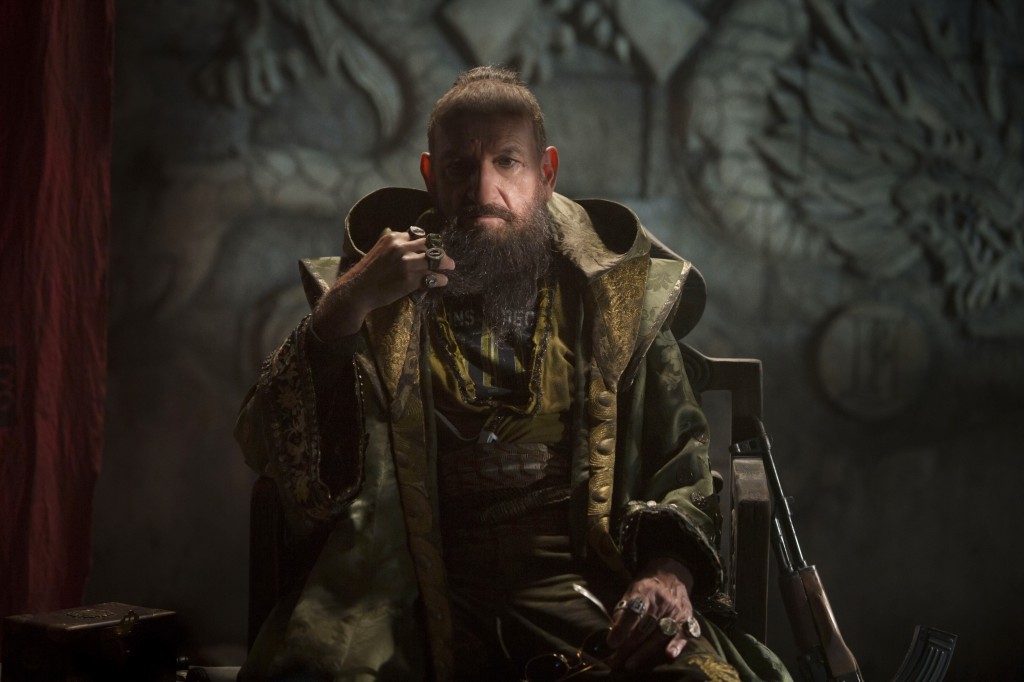
To my pleasant surprise, the movie had a rather brilliant interpretation of the character that not only removed my concerns about racism, but instead turned the finger back at the audience. The Mandarin was a carefully crafted stereotype that made a pointed statement about American perceptions.
Before we go deeper into the Mandarin in Iron Man 3, we should look at his background.
When the Mandarin first appeared in the pages of Tales of Suspense #50, he and every other Chinese character were little more than racial stereotypes and representations of Cold War fears. I suppose that it only makes sense given the time period that a character like Iron Man, who is so intertwined with the ideals of capitalism, would have been given enemies from the other side of the Iron and Bamboo Curtains. Another Iron Man villain created during the Cold War was the Crimson Dynamo from the Soviet Union.
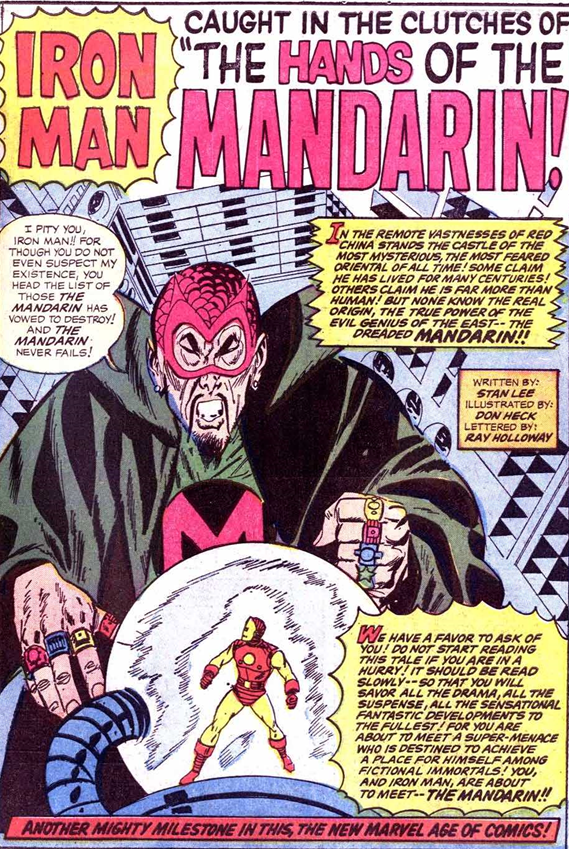
Unlike the Crimson Dynamo, who was an agent of his government, the Mandarin was not working for China. He was more like a feudal lord in his castle (literally a castle) than anything resembling a communist; however, his first appearance made sure to connect him to the Chinese government. In the issue several military officers came to request his aid creating weapons, but he scared them off. It was a scene meant to show the reader that this man even scared the Chinese army.
The Mandarin was intended to be a brilliant foe, able to compete with Tony’s intelligence, but despite telling us how smart he was, the climax of the issue was a Karate fight. Like many Asian characters in comics, he was reduced to being a stereotypical martial arts threat. Under different authors, his strategic intelligence has been developed, but in his first appearance it was only told to the reader, not shown.
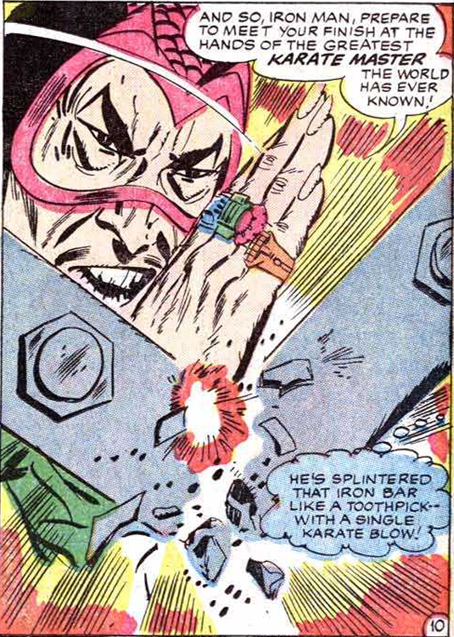
Overtime, a character like the Mandarin becomes difficult for writers. How do you write for a character that has racist overtones and whose entire conception is rooted in the politics of the 1960s? How do you make a popular villain less problematic? Many writers have tried their hand at the character, but in 2010 author Matt Fraction completely reimagined the him in The Invincible Iron Man Annual.
The Mandarin is the primary antagonist over the course of Fraction’s tenure on The Invincible Iron Man, although most of the time he isn’t shown in the comic. He is a true match for Tony’s intelligence and spent three years’ worth of comics outmaneuvering him from the shadows. The Mandarin doesn’t reveal himself or his plan until the last few arcs of Fraction’s run, but everything Fraction wrote built up to it.
Fraction’s Mandarin was a sleek businessman and terrorist who attacked Chinese targets as well as targeting Iron Man. Fraction managed to keep the Mandarin from being a representation of China itself by having Chinese superheroes also fighting him to protect their people. While Tony did aid the Chinese heroes, gone was the era where China was portrayed as evil or incompetent.
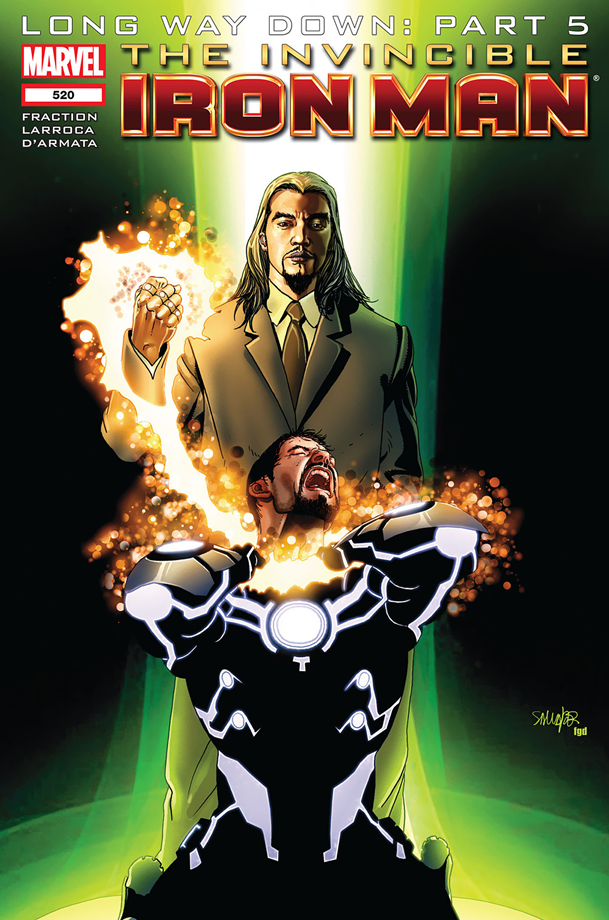
The actual reimagining of the character can best be seen in The Invincible Iron Man Annual #1. The annual is the story of the Mandarin’s life as told by him to a kidnapped Chinese moviemaker, Jun Shan. The Mandarin wants his story told on the big screen, but while he’s telling his grand lies, Shan is investigating the truth. As with any long-running comic character, the Mandarin’s backstory had become convoluted. Instead of wiping the slate clean, Fraction uses the uncertainty to create a Mandarin who is more propaganda than reality.
In the end, so much of what the reader has been told about the Mandarin over the years was revealed to be a lie. The Mandarin has spun his own story to build up his image. The idea that the character is more propaganda than reality is one that is used to great effect in Iron Man 3.
In Iron Man 3, the Mandarin is built up as the leader of a foreign terrorist group targeting the United States. He releases videos that claim responsibility for bombings and that threaten more attacks. However, when Tony finally locates the Mandarin, he realizes that the man never existed. The man in the videos was actually a British actor hired to distract America from the real situation behind the bombings.
Every single bit of the Mandarin’s persona was created to play on American fears. His clothing, his name, and the setting were all picked to trigger fears about foreign terrorists. The Mandarin in Iron Man 3 manipulates American race-based preconceptions in order to distract from the true evil—an American based company that was doing illegal experiments on US soldiers. Suddenly the Mandarin’s character design and actor made perfect sense.
Some fans were upset because the movie erased the character of the Mandarin from existence, but this isn’t the first time that Marvel has made him into something new. The Ultimate line of comics, which has inspired a lot of things in the cinematic universe, also removed the Mandarin as an individual and replaced him with a corporation named Mandarin International, so there is precedent to reimagine him as an idea rather than a person.
It seems clear that Marvel is aware that the character has problematic roots and that they have to be thoughtful when they use him. Whether they do that by reimagining him for a new era the way Fraction did, or whether it’s by using the idea in entirely new ways like in Iron Man 3 or the Ultimate Universe, they are ensuring the character has a place in the future.
What do you think about Iron Man 3’s take on the Mandarin? I’d love to discuss it with you in the comments!
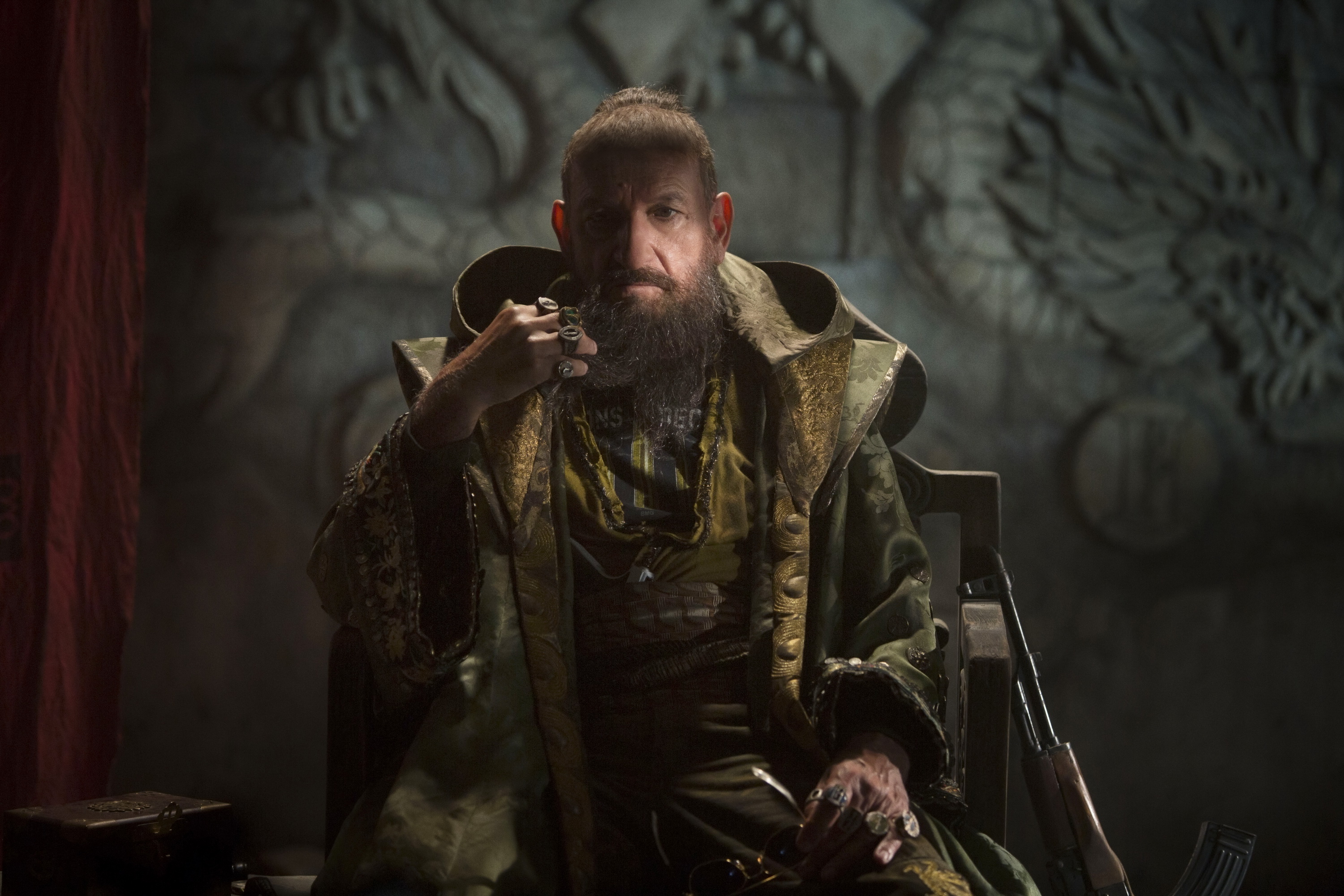
When I first heard that the Mandarin was going to be the villain i could not imagine how Marvel could use that character to their advantage in today’s more culturally sensitive environment. I have to say that I think the re-imagining was a brilliant stroke. The fact that they used one of our greatest living actors was a tremendous bonus 😀
I couldn’t agree with your assessment more. The way they remade the Mandarin, frankly, made the movie for me.
When I first heard they were using the Mandarin I was shocked. As an Iron Man fan I know how important he is to Tony’s comic, but so much about his character is an outdated relic–especially to try to introduce to new audiences.
I’ll admit I didn’t have a lot of faith that they would be able to navigate his character without it being racist. They really surprised me and earned some faith in me for future movies.
“As an Iron Man fan” – when I read something like this, I interpret this as, “As a some one who reads Wikipedia and doesn’t know much about comics…” I’ve been Iron Man fan my whole life, since I was in my first grade and I bought the firsty issue of Kurt Busiek’s Iron Man run, and Iron Man 3 was an awful movie, just like Iron Man 2.
That’s a great assessment of the character. I only own one Iron Man comic from my youth and it has both Mandarin and Fing Fam Foom. I think one of the best lessons Marvel and DC can learn from The Mandarin is to not make stereotypical characters because today’s enemy might not be tomorrow’s enemy. I do like that they have, for example, a positive depiction of a Muslim character in the X-Men.
“DC can learn from The Mandarin is to not make stereotypical characters” – well, it’s very good that DC is doing way better than Marvel, since they clearly respect their audience, unlike Marvel. Batman v Superman was an art-house masterpiece by Dardanne brothers in comparison to Iron Man 3. And what is even better, there’s nothing stereotypical about Mandarin. Iron Man 3 was horrible though.
“When I first saw the trailers for Iron Man 3, I was concerned about the inclusion of the Mandarin. He’s been one of Iron Man’s greatest foes for decades, but as his name suggests, the character was created without much sensitivity during an era when the US was deep in the Cold War.” – which sensitivity you’re talking about? “Mandarin” was a status that was given to highborn men during times of Imperial China. The Mandarin is a highborn man that was born in pre-communist China. I don’t find any insensitivity in here. It’s far more sensitive than identifying a fat black women by the name of “Black Mariah”.
“To my pleasant surprise, the movie had a rather brilliant interpretation of the character that not only removed my concerns about racism, but instead turned the finger back at the audience.” – so you consider unauthentic, poorly thought-out bestardization of an iconic characters, that’s done in a most trivial and disrespectful way possible, to be a “brilliant interpretation”?
“The Mandarin was a carefully crafted stereotype that made a pointed statement about American perceptions.” – I think you confuse clever analogies with shoehorned pseudo-metaphors that are executed in a most offensively unintelligent way possible, which is what “The Mandarin” in Iron Man 3 was.
“When the Mandarin first appeared in the pages of Tales of Suspense#50, he and every other Chinese character were little more than racial stereotypes and representations of Cold War fears.” – except, he wasn’t. Racial stereotype is something that’s created to generalize a selective ethnic group, to either demonize it or mock. Mandarin was personified as an individual rather than something that is accumulative representation of Chinese and Chinese people. The fact that he’s not even ethnically Chinese, since his mother was white, proves this to be correct. Character-wise, there are no “racial” undertones written into Mandarin. His visual design though, that is the only thing on what you can point out your finger. But if you think that the character should be dismissed simply because of his original design, then I hope you’re going to write same post when Luke Cage TV-show will be released on Netflix. Since, from what I can recall, vast majority of the villains in rouges gallery of Luke Cage are racial stereotypes that were created during the rise of blacksplotation genre.
“I suppose that it only makes sense given the time period that a character like Iron Man, who is so intertwined with the ideals of capitalism, would have been given enemies from the other side of the Iron and Bamboo Curtains. Another Iron Man villain created during the Cold War was the Crimson Dynamo from the Soviet Union.” – Crimson Dynamo is one the primmest examples when Marvel were trying to bring diversity and avoid stereotyping in their comics. Anton Vanko, original Crimson Dynamo, was one of the first non-stereotypical Russian characters, despite the fact that he was a villain originally. He was a man with a good heart who sacrificed his own life to save Tony Stark. Which didn’t stop Iron Man 2 (another “GREAT” movie) from bestardizing him as well, by going into opposite direction. By making him a traitor who died in Gulag from alcoholism.
“Unlike the Crimson Dynamo, who was an agent of his government, the Mandarin was not working for China. He was more like a feudal lord in his castle (literally a castle) than anything resembling a communist; however, his first appearance made sure to connect him to the Chinese government. In the issue several military officers came to request his aid creating weapons, but he scared them off. It was a scene meant to show the reader that this man even scared the Chinese army.” – which was a brilliant character trait. Giving to a Mandarin this anti-governmental, anarchistic, “F*&^ Communism” attitude, which has been always attached to his character, was a good decision which showed that the Mandarin does not antagonize any race or nation. He antagonizes authorities and governments, which already gives more diversified world outlook and motivation to his character. Which shows that he’s against the system, not people in particular.
“The Mandarin was intended to be a brilliant foe, able to compete with Tony’s intelligence, but despite telling us how smart he was, the climax of the issue was a Karate fight.” – hm… A superhero comic book from the 60’s ends with an action scene in which hero fights the villan? I never saw that before…
“Like many Asian characters in comics, he was reduced to being a stereotypical martial arts threat.” – martial arts and fighting disciplines are part of the Chinese culture. Mandarin is man who has been raised as an orthodox Chinese man from pre-communist China. It would make sense that a man like him would learn martial arts. Not to mention, he didn’t just learn martial arts. He studied everything. He studied science, history, philosophy, etc. He wanted to achieve an utter perfection with his mind and his body. And it’s clearly stated in his origin that he studied martial arts. So no, the point about “every Asian must know martial arts” doesn’t work here, since Mandarin had to learn martial arts. He wasn’t born with the knowledge of martial arts like these stereotypes suggest.
“Under different authors, his strategic intelligence has been developed, but in his first appearance it was only told to the reader, not shown.” – yeah, since it was very often in the comics, especially the comics from the Silver Age, when the first issue of comic book pronouncedly illustrated to the reader every characteristic of the character.
“Overtime, a character like the Mandarin becomes difficult for writers.” – considering the fact that the Mandarin has appeared in multiple storylines and events during Bronze and Modern Age of comics, it seems that the writers didn’t have much problem with him. John Byrne used the Mandarin as a prominent character for the entirety of his early 90’s run. If there was any problem with writing the Mandarin for him, he wouldn’t even include the character in his run.
“How do you write for a character that has racist overtones” – same as you write a comic book with a black superhero who got his superpowers in a jail and whose last name conveniently happens to be a synonymous with the word “Jail”.
“and whose entire conception is rooted in the politics of the 1960s?” – how? Mandarin’s conception has nothing to do with the politics of the 1960’s, since it’s just a period of time when he was created, not something that is inseparable from his character. He’s been appearing constantly throughout 70’s, 80’s, and 90’s. If the character’s conception is based on a specific time period, then that character should feel out of place when he’s in a different time periods. With Mandarin, it was never the case.
“How do you make a popular villain less problematic?” – by making him according to comic books, in which there’s nothing problematic about the character?
“Many writers have tried their hand at the character, but in 2010 author Matt Fraction completely reimagined the him in The Invincible Iron Man Annual.” – I will stop you right there, because it’s seems that your knowledge of the character are limited with knowledge about his 1960’s appearance and Matt Fraction’s series. Matt Fracton didn’t do anything “spectacularly” new with the character. In fact, his version of the Mandarin seems much more superficial in comparison to some of the more complex iterations of the character, like in John Byrne’s run. Fraction didn’t invented anything for his Mandarin. What he did, he took what was already established.
“The Mandarin is the primary antagonist over the course of Fraction’s tenure on The Invincible Iron Man, although most of the time he isn’t shown in the comic. He is a true match for Tony’s intelligence and spent three years’ worth of comics outmaneuvering him from the shadows. The Mandarin doesn’t reveal himself or his plan until the last few arcs of Fraction’s run, but everything Fraction wrote built up to it.” – hm… Reminds of the beginning of Kurt Busiek’s relaunch of the Iron Man series from the 1998, where in the first issue dreadnoughts attacked Tony Stark, and the whole series was was building up towards story arc in which Mandarin was revealed to be behind everything.
“Fraction’s Mandarin was a sleek businessman and terrorist who attacked Chinese targets as well as targeting Iron Man.” – Fraction’s? No, not Fraction’s. The Mandarin who’s been presented as a “sleek businessman and terrorist who attacked Chinese targets as well as targeting Iron Man” has been first introduced in 1973 by Mike Freidreich and George Tuska, in a storyline in which Mandarin wanted to sabotage Tony Stark by making Stark’s workers believe that Tony Stark is a traitor who was selling weapons to the enemies of America.
“Fraction managed to keep the Mandarin from being a representation of China itself by having Chinese superheroes also fighting him to protect their people.” – you mean like in Dragon Seed Saga? You mean when Chinese government asked Iron Man to take down the Mandarin after Mandarin have threatened the government by saying that he will destroy them?
“While Tony did aid the Chinese heroes, gone was the era where China was portrayed as evil or incompetent.” – almost like in John Byrne’s Iron Man run from the early 90’s, which deliberately illustrated that not all Chinese are evil and bad. From what I can recall, Tony Stark went to China because he was dying from a nervous system damage, and the only doctor who could help him was Dr. Su Yin, with which he fell in love afterwards. I thought that John Byrne’s run were subtly showed that the Mandarin doesn’t represent anything but himself and his twisted view on the world, and everyone will suffer if he’ll win, be it Americans or Chinese.
“The actual reimagining of the character can best be seen in The Invincible Iron Man Annual #1.” – have to stop you again. No, the re-imagining of the character can be seen in 1973, when Gorge Tuska illustrated Mandarin as a manipulative businessman called Gene Khan, which became the most popular design for the character in the Modern Age.
“The annual is the story of the Mandarin’s life as told by him to a kidnapped Chinese moviemaker, Jun Shan. The Mandarin wants his story told on the big screen, but while he’s telling his grand lies, Shan is investigating the truth. As with any long-running comic character, the Mandarin’s backstory had become convoluted. Instead of wiping the slate clean, Fraction uses the uncertainty to create a Mandarin who is more propaganda than reality.” – you mean that awful attempt by Fraction to give to a Mandarin his own “Killing Joke”, which completely fails as a standalone Mandarin story (since it’s not even about him), or as a entertaining story in general? The Story of My Life is a spoof, not a definitive story. It’s a dullish satire that’s based on a real life story of the Korean director Shin Sang-Ok and his wife Choi Eun-hee, who were kidnapped by Kim Jong-il. It’s a poorly written satire, not a definitive Mandarin story.
“In the end, so much of what the reader has been told about the Mandarin over the years was revealed to be a lie. The Mandarin has spun his own story to build up his image. The idea that the character is more propaganda than reality is one that is used to great effect inIron Man 3.” – no, I think you’re trying to substitute the real context behind the story. Despite the fact that it’s not a good story, the story plays out to illustrate Mandarin’s insecurity about the perception which people that fear him have, since he’s always been known to be a nobleman from the noble family with aristocratic bloodline. Despite all that, Mandarin is still a character. Nothing changes. After it revealed that he’s been lying about his past. he’s still the character he’s always been. He still poses a serious threat, he still has his ten rings, and he is still an enemy of Iron Man. The illegitimacy of Mandarin’s past doesn’t remove the character of the Mandarin. Iron Man 3 removes the character of the Mandarin completely. You see the differences? Mandarin didn’t turn into a perpetually stoned actor with a silly accent. In fact, it probably made him more villainous and darker than before.
“Every single bit of the Mandarin’s persona was created to play on American fears. His clothing, his name, and the setting were all picked to trigger fears about foreign terrorists. The Mandarin in Iron Man 3 manipulates American race-based preconceptions in order to distract from the true evil—an American based company that was doing illegal experiments on US soldiers. Suddenly the Mandarin’s character design and actor made perfect sense.” – I personally don’t get this whole pretentious hype around the so-called “ingenious” twist about which many people think too much, trying to find something clever when there is nothing clever about it.
Thr twist was a cheap option that was not executed well and it didn’t had the abstract meaning which maybe it originally intended to have.
Shane Black, who is definitely not someone who has brilliant writing and directing skills, intended to mock the perception of terrorism in society, he would have an entire film dedicated on exploration of that. But he’s too dumb and generic to actually make something good out of that concept. People are giving some generic excuses for the fact that Shane Black did very poor execution with the story and the conceptuality of the film. Shane Black is the one who thinks that tasteless one-liners and dull action is more important than sophistication and inventiveness. He never wrote or directed a movie that really has something intellectually to offer. He wrote Last Action Hero, after all. That’s says a lot about his style.
And what was so ingenious about that plot reveal? Are you one of those people that believe that unexpected twist makes a good movie? By that logic, you can say that every Shyamalan film is a masterpiece because every movie has an unexpected twist. Twist has to be logically incorporated into the film and he has to have a significant purpose. Purpose of a good plot-twist is to escalate the story to a new level and elevate the tension and drama. Was that the case with Iron Man 3? No. With, or without the twist, the movie would still be a trivial trainwrreck. The so-called “genius twist” was very poorly executed and badly integrated into the story and it served no thematic purpose. There was no extremely prominent allusions. There were just some superficial attempts to give some pseudo-message that causes the echoes of laughter rather than really makes you think about something. Take Christopher Nolan’s approach for example. He has made himself a career on such things as non-linear structure and nontrivial narrative. The plot twists in his movies are important puzzles of the bigger picture. None of them feel out of place or forced. The plot twists in his movies are logically incorporated pieces of the story that intensify the story and the motivations of the characters. The good plot twist has to ameliorate the story to a new level. The bad plot-twist, like in the case with Iron Man 3 or with any post Sixth Sense Shyamalan film, makes a regress in the story, thus it takes any momentum and interest in the actual story.
What’s also creates a huge problem after the reveal happens, there is no escalation to the story and suspense. The movie after that becomes even more generic and predictable than it was before. The point of a good plot twist is to escalate tension and drama, not to eradicate it completely.
“Some fans were upset because the movie erased the character of the Mandarin from existence, but this isn’t the first time that Marvel has made him into something new. The Ultimate line of comics, which has inspired a lot of things in the cinematic universe” – but certainly not Iron Man movies. Iron Man movies have been consistently borrowing aspects from the 616 universe. Well, they not always adapt them properly (in fact, the only Iron Man movie that didn’t bestardized its source material was the first Iron Man), but elements from 616 universe can be definitely seen. Which isn’t surprising, considering that Ultimate Iron Man, just like any other Ultimate Marvel character that isn’t Spider-Man or X-Men, is an empty, shallow shadow of his superior 616 counterpart. There’s never been even a decent Iron Man story in Ultimate Universe.
“also removed the Mandarin as an individual and replaced him with a corporation named Mandarin International, so there is precedent to reimagine him as an idea rather than a person.” – you mean that miniseries from 2012 that was SPECIFICALLY written to loosely tie-in with Iron Man 3? When that miniseries was published, Iron Man 3 already had finished script (a terrible script though). Therefore, I highly doubt that this miniseries had any influence on Iron Man 3, considering that it’s more like Marvel approached the writer to write a comic book that would tie-in with the movie.
“It seems clear that Marvel is aware that the character has problematic roots and that they have to be thoughtful when they use him.” – so that’s why Marvel become overly sensitive only when it comes to characters whose portrayal in the movie might affect the box office results on the Chinese market, but they never become sensitive when it comes to middle-eastern people, Russians, or Mexicans?
“Whether they do that by reimagining him for a new era the way Fraction did” – Fraction didn’t re-imagined the character though. If you want to give a credit to someone who re-imagined the Mandarin, you have to give credit to John Byrne. His Mandarin is by far the most profound and complex iteration of the character that there has ever been.
“or whether it’s by using the idea in entirely new ways like in Iron Man 3 or the Ultimate Universe” – does “by using the idea in entirely new ways” means “by utterly bastardizing the character, by depriving him from all the complexity and depth”?
“they are ensuring the character has a place in the future.” – well, if that is “the future” of the Mandarin, then, good lord, someone should step in and save him from Marvel and their incompetent attitude towards this amazing character. Maybe DC would buy the rights for the Mandarin and show Marvel how to properly portray villains?
“What do you think about Iron Man 3’s take on the Mandarin?” – I think I’ve explained my thoughts very substantially in this response. I think it’s terrible, just like the movie itself.
[…] the Mandarin made his first appearance in 1964, it was as a racist Chinese caricature in the pages of Marvel’s Tales of Suspense, a […]
[…] Marvel back in 2013 for whitewashing what was originally an Asian villain. Interestingly, however, Kingsley’s rendition was a reformative effort by the MCU to make amends for the comic book Mandarin, which played […]